Barack Obama: Memoir praises India opposition leaders
- Published
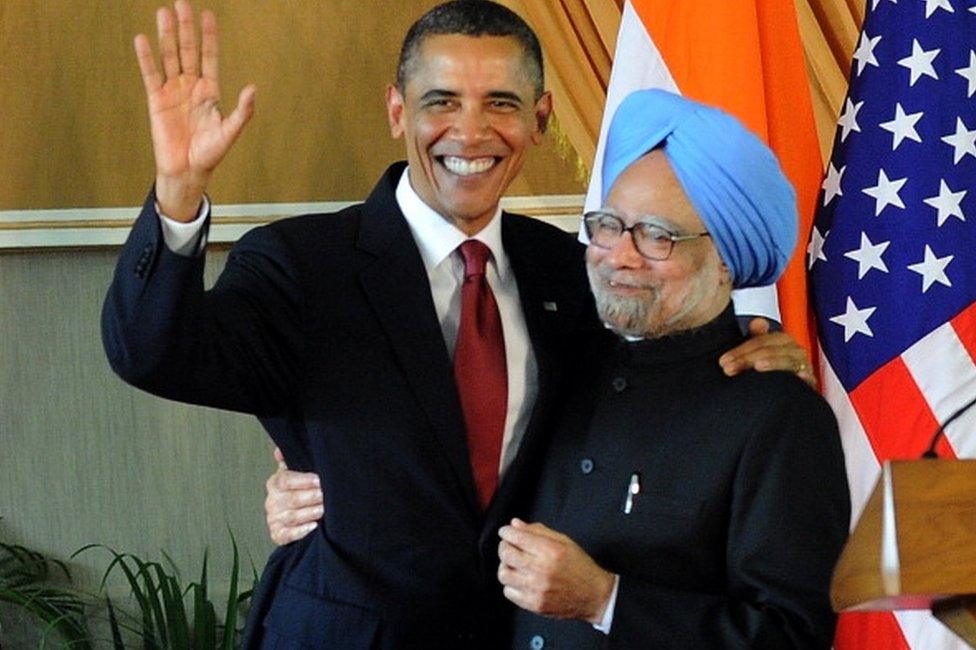
Mr Obama describes Mr Singh as "wise" and "thoughtful"
Former US president Barack Obama's memoirs have already caused a minor stir in India - his frank, unflattering description of Rahul Gandhi, the leader of the main opposition Congress party incensed the latter's supporters and amused his detractors.
A Promised Land, the first volume of Mr Obama's account of his political career which released on Tuesday, is a vivid and racy read. In it, he spends some 1,400 words writing of his first visit to India in November 2010 when the now-opposition Congress party was in power - and his impressions of then prime minister Manmohan Singh and party president Sonia Gandhi.
On Manmohan Singh
Mr Obama recalls that when he met Manmohan Singh, he had told him that he feared "rising anti-Muslim sentiment had strengthened the influence of Hindu nationalist BJP", the main opposition party at the time.
Mr Singh had resisted calls to retaliate against Pakistan after gunmen attacked the financial capital Mumbai leaving 166 dead. But "this restraint had cost him politically," Mr Obama writes.
"In uncertain times, Mr President, the call of religious and ethnic solidarity can be intoxicating. And it's not so hard for politicians to exploit that, in India, or anywhere else", Mr Singh had told him.
Barack Obama tells the BBC about the "crazy conspiracies" and "truth decay" in US politics
Mr Obama agreed, recalling a conversation he had with the Czech Republic's first president after the Velvet Revolution, Vaclav Havel, during a visit to Prague "and his warning about the rising tide of illiberalism in Europe".
"If globalisation and historic economic crisis were fuelling these trends in relatively wealthy nations - If I was seeing it even in the United States with the Tea Party - how could India be immune?" Mr Obama writes.
During a dinner party hosted by Mr Singh on Mr Obama's first evening in Delhi, Mr Singh "spoke openly about the clouds he saw on the horizon".
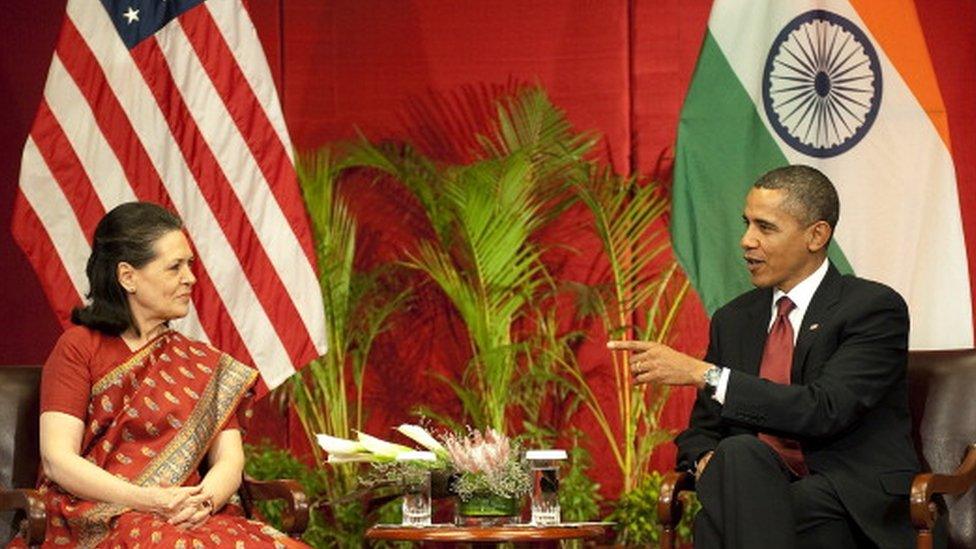
Mr Obama describes Sonia Gandhi as "striking woman" with a "quiet, regal presence"
Mr Singh mentioned the slowing economy - the 2007 subprime mortgage crisis in the United States had developed into a full-blown global crash by this point.
The Indian prime minister, Mr Obama writes, was also concerned about the continuing tensions with nuclear-armed rival and neighbour Pakistan.
"Then there was the problem of Pakistan, and its continuing failure to work with India to investigate the 2008 terrorist attacks on hotels and other sites in Mumbai had significantly increased tensions between the two countries, in part because Lashkar-e-Taiba, the terrorist organisation responsible, was believed to have links to Pakistan's intelligence service."
He describes Mr Singh as the "chief architect of India's economic transformation" and "wise, thoughtful, and scrupulously honest".
Mr Singh was a "self-effacing technocrat who'd won the people's trust not by appealing to their passions but bringing about higher living standards and maintaining a well-earned reputation for not being corrupt", Mr Obama observes.
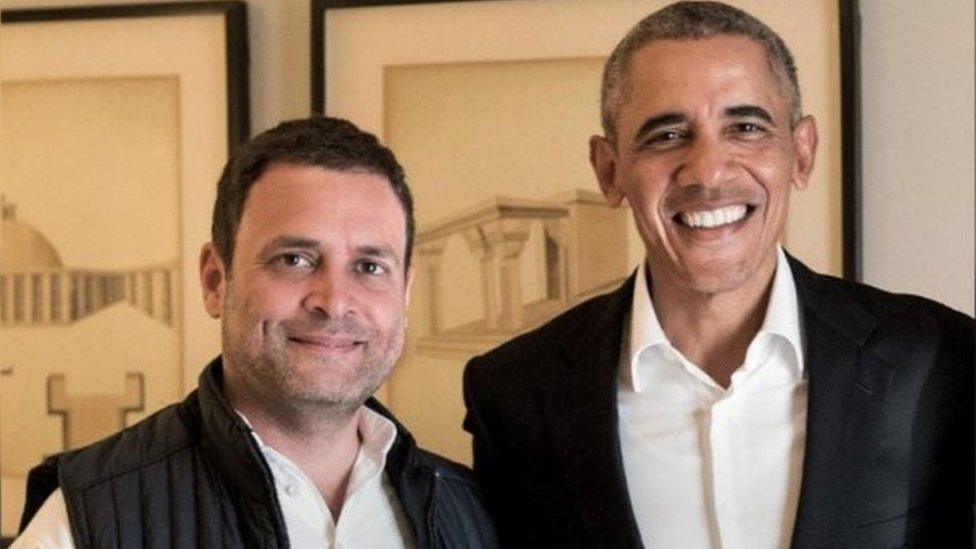
Mr Obama writes Rahul Gandhi had a "nervous, unformed quality about him"
"While he would be cautious in foreign policy, unwilling to get out too far ahead of an Indian bureaucracy that was historically suspicious of US intentions, our time together confirmed my initial impression of him as a man of uncommon wisdom and decency," Mr Obama writes.
On Sonia Gandhi
Mr Obama described Sonia Gandhi, the then president of the Congress party, "as a striking woman in her sixties, dressed in a traditional sari, with dark, probing eyes and a quiet, regal presence".
"That she - a former stay-at-home mother of European descent - had emerged from her grief after her husband was killed by a Sri Lankan separatist's suicide bomb in 1991 to become a leading national politician testified to the enduring power of the family dynasty," he writes.
Italian-born Sonia Gandhi's husband Rajiv Gandhi who was once prime minister, was killed by a suicide bomber at a rally in Tamil Nadu state in 1991.
At a dinner, Mr Obama writes, Ms Gandhi listened more than she spoke, "careful to defer to [Mr] Singh when policy matters came up, and often steered the conversation toward her son".
"It became clear to me, though, that her power was attributable to a shrewd and forceful intelligence."
On Rahul Gandhi
Mr Obama said Rahul Gandhi "seemed smart and earnest, his good looks resembling his mother's".
"He offered up his thoughts on the future of progressive politics, occasionally pausing to probe me on the details of my 2008 campaign," Mr Obama writes.
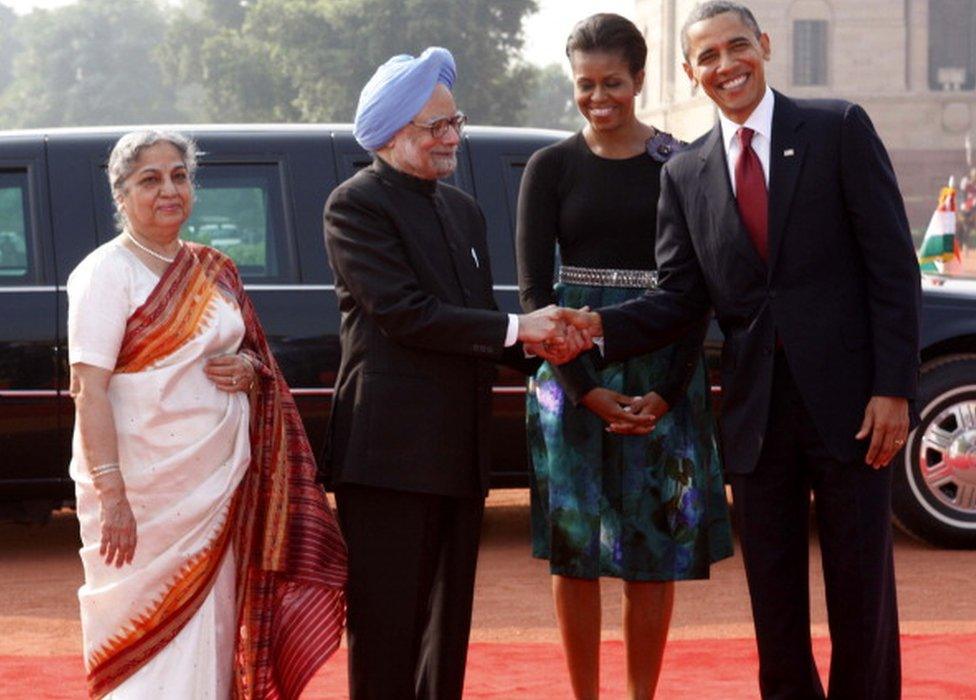
Mr Obama's three-day visit to India in 2010 was his longest to any country since assuming the presidency
"But there was a nervous, unformed quality about him, as if he were a student who'd done the coursework and was eager to impress the teacher but deep down lacked either the aptitude or the passion to master the subject."
(These remarks about Mr Gandhi, which appeared in an early review, external of the book in the New York Times by author Chimamanda Ngozi Adichie, angered some Congress party supporters,, external with one party leader saying he had "un-followed" Mr Obama on Twitter in protest.)
On the future of India
Modern day-India, Mr Obama writes, was a "success story, having survived repeated changeovers in government, bitter feuds within political parties, various armed separatist movements, and all manner of corruption scandals".
But despite the thriving democracy and the freer economy, India still "bore little resemblance to the egalitarian, peaceful, and sustainable society Gandhi had envisioned". Inequality was rife, and violence "remained an all-too-pervasive part of Indian life".
Mr Obama writes that after leaving Mr Singh's residence on that November evening he wondered what would happen when the then 78-year-old prime minister left office.
"Would the baton be successfully passed to Rahul, fulfilling the destiny laid out by his mother and preserving the Congress Party's dominance over the divisive nationalism touted by the BJP?" he wonders.
"Somehow, I was doubtful. It wasn't Singh's fault. He had done his part, following the playbook of liberal democracies across the post-Cold War world: upholding the constitutional order; attending to the quotidian, often technical work of boosting the GDP; and expanding the social safety net.
"Like me, he had come to believe that this was all any of us could expect from democracy, especially in big, multiethnic, multi-religious societies like India and the United States."
But Mr Obama also found himself "asking whether those impulses - of violence, greed, corruption, nationalism, racism, and religious intolerance, the all-too human desire to beat back our own uncertainty and mortality and sense of insignificance by subordinating others - were too strong for any democracy to permanently contain.
"For they seemed to lie in wait everywhere, ready to resurface whenever growth rates stalled or demographics changed or a charismatic leader chose to ride the wave of people's fears and resentments."
Mr Obama's question was answered in 2014, when Narendra Modi led the Hindu nationalist Bharatiya Janata Party (BJP) to a sweeping victory.
Mr Obama visited again in 2015 when Mr Modi was prime minister, becoming the first US president to visit India twice while in office.
But the first half of the former president's memoirs ends with the death of Osama Bin Laden in 2011.
The second part is likely to include his impressions of Mr Modi.
Mr Obama's trip ended with a lavish state dinner at the residence of Indian President Pratibha Patil in Delhi
- Published15 November 2020
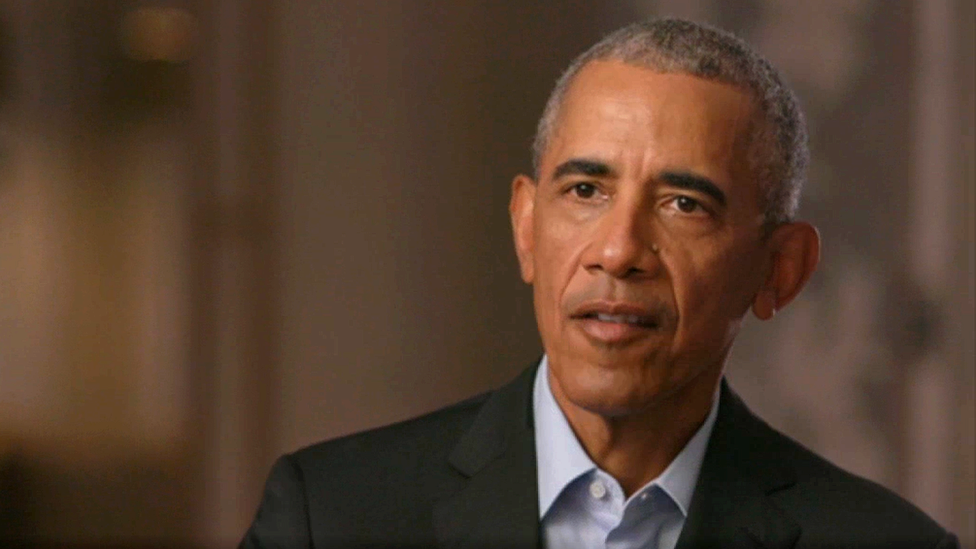
- Published8 November 2010
- Published8 November 2010
- Published9 November 2010